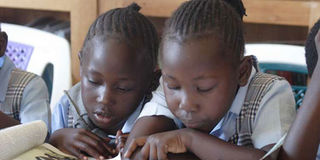Fight illiteracy to release our potential

Pupils from Power View Academy in Kisumu County, read books at the Sondu Miriu public library. PHOTO | TOM OTIENO | NATION MEDIA GROUP
What you need to know:
- Literacy is the backbone of formal education and it is time to reflect on what literacy really means for individuals, households, communities, and nations.
- Illiteracy denies its victims a fair chance to compete for scarce opportunities, whether it is against their fellow men and women, or against the unpredictable and often uncompromising state of nature.
- With limited sources of information for most members of the community, social, economic, and political mobilisation are inhibited.
- Societies that are encumbered with illiteracy have limited opportunities to communicate their own values and influence others.
Thursday September 8 was World Literacy Day. This year, besides being the 50th anniversary of the global literacy day, it happened in the first year of the new global development agenda with ambitious goals targeted for accomplishment by 2030.
The new agenda emphasises inclusion in every sphere of life. This explains the running theme of “leaving no one behind” that is discernible in most of the global targets identified in the Sustainable Development Goals framework, including SDG4, which focuses on access to quality education for all.
As the low key but important day passed, I wondered if the value of literacy was fully appreciated in our society. Literacy is the backbone of formal education and it is time to reflect on what literacy really means for individuals, households, communities, and nations.
For a start, let us remind ourselves of the obvious fact that we live in the information age. In these times, information gathering, processing, storage, transmission, and, most importantly, timely deployment separate those who prosper from those who stagnate.
Individuals who are limited in their access to information to what they hear on radio, TV, or from neighbours are cut off from at least 70 per cent of the information they need. With limited sources available to them, they are denied the privilege of crosschecking and verifying what they hear before deploying such information in decision-making.
This means that they base all their individual and household, sometimes life-and-death decisions, on limited and less reliable information. This is the mountain the illiterate members of our society have to climb in their effort to get by in this information-powered world.
This is what illiteracy does to its victims — it denies them a fair chance to compete for scarce opportunities, whether it is against their fellow men and women, or against the unpredictable and often uncompromising state of nature.
When communities communicate mainly through the spoken word because many of its members are limited in the use of the written word, they face myriad challenges. First, their capacity to preserve and transmit their knowledge and norms across generations is compromised.
This may, in fact, explain why many African nations, some of which were great civilisations in the medieval days, were overtaken and conquered by other nations. They lost most of their indigenous knowledge.
LIMITED OPPORTUNITIES
Most find themselves disenfranchised in the rapidly globalising world. They are constantly pressured to imbibe socio-economic and cultural wisdom forced upon them from the rest of the world without a knowledge base of their own with which to interrogate the new values.
Secondly, with limited sources of information for most members of the community, social, economic, and political mobilisation are significantly inhibited. And when they happen, they revolve mostly around emotional rather than rational issues.
This is because to form a rational opinion one must go through the process of gathering and processing full information, which cannot be found exclusively in oral sources, about the phenomenon of interest.
With limited access to the written word, the conditions for rational decision-making are simply absent in most of our societies.
Thirdly, societies that are encumbered with illiteracy have limited opportunities to communicate their own values and influence others. Simply put, these are societies ripe for domination by others, including shouldering the burden of imperialist influences of those better endowed with the skills to collect, collate, and communicate new information.
In this era information rules, therefore, superior and comprehensive information transcends limited and inferior knowledge.
Finally, illiteracy begets illiteracy. As Michael Kremer aptly argues in his O-ring theory, pockets of illiteracy easily become enduring. People’s social, political, and economic outlook is framed by their level of exposure to information.
This outlook, in turn, impacts investment of resources in promotion of literacy, thereby curtailing opportunities for such exposure.
In Kenya, these pockets are regional, social class, income group, disability, status, and gender-based.
As we celebrate the 50th World Literacy Day and 53 years since the elimination of illiteracy was pronounced as one of independent Kenya’s top priorities, let us eliminate these pockets of illiteracy to release our people’s potential.
Dr Manyasa is the Uwezo Kenya country manager. [email protected].





